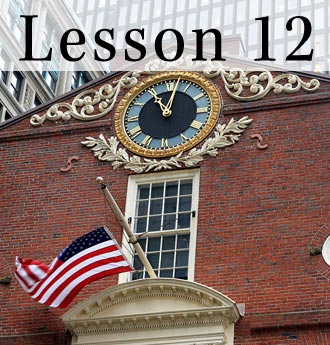The Resource Center » Level 3 » Unit 2 »
Lesson 12: How Did the Delegates Distribute Powers between National and State Governments?

Lesson Purpose
Lesson Objectives
- describe the major powers and limits on the national government, the powers that were specifically left to states, and the prohibitions the Constitution placed on state governments,
- explain how the Constitution did and did not address the issue of slavery, as well as other questions left unresolved in Philadelphia, and
- evaluate, take, and defend positions on how limited government in the United States protects individual rights and promotes the common good and on issues involving slavery at the Philadelphia Convention.
Lesson Terms
Lesson Biographies
Lesson Court Cases
Case Summary
Mr. and Mrs. Caleb Bull, the stated beneficiaries of the will of Norman Morrison, were denied an inheritance by a Connecticut probate court. When the Bulls attempted to appeal the decision more than a year and a half later, they found that a state law prohibited appeals not made within 18 months of the original ruling. The Bulls persuaded the Connecticut legislature to change the restriction, which enabled them to successfully appeal the case. Calder, the initial inheritor of Morrison's estate, took the case to the Supreme Court.
Question(s)
Was the Connecticut legislation a violation of Article I, Section 10, of the Constitution, which prohibits ex post facto laws?
Answer(s)
No. In a unanimous decision, the Court held that the legislation was not an ex post facto law. The Court drew a distinction between criminal rights and "private rights," arguing that restrictions against ex post facto laws were not designed to protect citizens' contract rights. Justice Chase noted that while all ex post facto laws are retrospective, all retrospective laws are not necessarily ex post facto. Even "vested" property rights are subject to retroactive laws.
Lesson Primary Sources
Martin's extensive criticism of the Philadelphia Convention, its methods and its work. He especially focuses on the secrecy surrounding the convention and his perceptions of bias toward a large national government.






